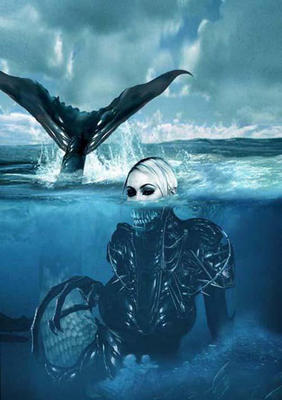The Ogress Just Offshore

Too much of water hast thou, poor Ophelia.
-- Laertes, Hamlet
***
Picking up the previous post “The Boob Tube,” I have been sighted, or insighted, not as much by my history (that perhaps is compass or rudder) but by the inside history, the one I fancy or the one which is the shore I fantasize: sexual fantasy seems permanent in the psyche, the rocky substratum which refuses to let go of its thrall. Its gambols and raids out in the wilderness of infinite night are endlessly retold round the hearth which excludes them; though the life gets saner and safer the thrill of the thrall remains, just as the octanes of whiskey will always hunt and haunt and harbor the swigger of a dried booze-hound.
Yes, as I wondered in that last post, who is she I fancy anyway? She was a girl walking around the rim of forest pond, so much like Paula who led me into the forest when I was 3 (she was 4) to hunt for worms. The same? My backward glance still gets excited, in a dark sweet strange way, at the memory of that reverie which so bowered my early sexual history; yet is there a difference when I see that girl as Paula, or all of the Paulas I have desired, as some verboten voracious Maid of the Pool a la Salamacis or Artemis, or something darker, stranger, whom my root sexuality understands with a consciousness most differentiated to abyss, the way my meditative ruminating studious aesthetic mind runs a brick ediface around the raw sexual pool? There is a strangeness to the fantasy which is extra-human, transpersonal, which I appropriate (fuck) at some extra-mortal peril.
MELUSINE
October 1995
She is the dark startle
of a dream staining
my first thoughts today—
a drowning dare
in black velvet underwear.
A melusine dripping on
the shores of my crashing world,
she spoke my name with a kiss.
How could I resist the winds
which keened round her bed,
older than the surf itself
which crushes boulders to sand?
All night she wove her
seal-sleek body around
the aching acre of my
half-submerging song.
I wake this morning
bleeding honey from every
pore she kissed.
All that now remains
of her are these lines
dripping seaweed on the page.
Some spillage of that swoon
has me thinking of you
so like and unlike her,
now far too many
dreams away. Some
ink too dreadful writes your
shadow into her name.
Today my heart's bed
refuses to warm me
from the sweet smash
of that bitterly fading surf
in which the two of you
wrapped your arms
around me in a wave
and then sent me away
wilder than wind.
***
(The) tendency to reduce all transpersonal contents to personalistic terms is the most extreme form of secondary personalization. The exhaustion of emotional components and secondary personalization have an important historical function to fulfill, in so far as they help to extricate ego consciousness and the individual from the clutches of the unconscious. That explains why they always appear during the transition from the prepersonal and suprapersonal to the personal. But when secondary personalization seeks to assert itself by devaluing the transpersonal forces, it produces a dangerous overvaluation of the ego. It is a typical false constellation of the modern mind, which is no longer capable of seeing anything that transcends the personal sphere of ego consciousness.
n Erich Neumann, The Origins and History of Consciousness
***
THERE’S MORE TO LIFE
2003
When I was twelve my mother told
Me, Son, there’s more to life than a
Bed, a babe, and a bottle of
Booze. Lord knows I drank enough years
Trying to prove her wrong. But for
Every bed I found spread with downy
Billows, a sterner beach was what
I always woke to, the surf not
Gentle, with winds far north of her
Sweet kiss. My mother has proved
Right, but only as I made her
Wrong, my nights a legion of leaps
From lap to lap until I came
To this salt of wild derange.
The More’s not hers to swell or change.
***
Much as the wild and treacherous Black Sea was euphemistically called the “Euxines,” the “hospitable sea,” or the Erinnyes were renamed the Eumenides, and the abysmal unknowableness of Godhead become the “All-loving and Merciful Father” and the “eiapopeia of children,” so now we mistake the transpersonal for the merely personal. The primordial divinity of the Creator and the fierce, infinitely strange, ancestral totem-animal that dwells in the human soul have been so garbled that they now purport to derive from a prehistoric gorlla father or from a deposit of many such fathers, who have not conducted themselves well toward their “children.”
-- Neumann, ibid 388
***
LATE AUTUMN, PORT ORANGE
1994
There are virilities
you cannot ride
in your sleep.
Your urban morning
has no saddle for
this wild sea, nor
will such winds as these
rein to any corporate task.
No.
Something irresistible
stays here.
Watching storms batter
the tide, it's clear:
Like that raw rock
Rilke saw in Apollo's
marbled brow,
this sea's day churns
dark and urgent and cold:
You must derange
your life to save it.
***
Even the exaggerations of secondary personalization are expressions of man’s efforts to regain possession of exteriorized psychic contents by introjecting them. But the necessary consequence of this process, whereby contents that before seemed to be outside are diagnosed as inside, is that transpersonal forces now appear in the human psyche and are recognized as “psychic factors.” When this happens, partially in the psychology of instinct, and quite consciously in Jung’s theory of archetypes, it means that an adequate assimilation has been achieved. But when secondary personalization is perverted, it leads to an overexpansion of the ego, which thereupon tries to demolish the transpersonal by calling it mere illusion and reducing it to personalistic ego data.
OGRE ON THE ROAD
2001
Perhaps the minotaur
is a poet. Is Poetry.
A hoary hammer, like sex.
Didn’t the Irish bard
Senachen once meet
a churl on the road
whose hellmouth
was the gate of all song?
Why are sweet words
suddenly so loathsome
on this road we
must all travel some night?
In the Irish tales
the lord of the South
was a harper-changeling,
a green giant who’d
as soon sing as lose
his head (or yours)
at the solstice. (And oh
what a pretty wife had
he, wearing only that
green pubic sash...)
Horrid lug was just
one his guises. A signal
that you’ve hit the
mid-point of the barrow.
Question is, what then?
Senachen could have
turned back and trudged
home as Senachen,
but instead he got past
and went on to become
a Taleissin. Will I eventually
write poems too, after all
this posing and posing
in poisoned trash heaps?
The problem is, a lyric
is not a tale. No stripper
here with nipples to offer
in ripened sequence: this
is flashing: not fiction,
but close. Poets play fast
with truths but from the
other side: We dip the day’s
pewter turds into moonwater
and —voila!—pull out a
silvery bone of spirit.
Preter-truths, a peel more
real than the real itself.
But who cares for such
jugglery today? Poems for
a penny, a dozen for two!
Least of all cares this oaf,
burdened with this
bushel of rancid poems.
I would rather sneakeypete
around this beast of sweet
utterance just to get home again.
To what at least is liveably real.
But I wrote my way here and
must write my way through.
For now these satires,
black-pelted raillery at
the ogre on the road.
I’m a king’s fool, worthy only
in reverse, offering for your
pleasure ugly words on a page
of foul brine, a bitterroot
inked with all that somehow
must be said before there’s
any going on or going home.
***
As a result, the whole meaning of secondary personalization as a prerequisite for conscious assimilation is done away with, because the transpersonal is now in fact repressed. It can no longer be consciously assimilated, and proceeds to work negatively as a vague and powerful “unconscious” factor inside the psyche, just as it did outside at the beginning of man’s development. The problematical thing about this turn of events is that in itself it is legitimate and necessary, and only leads to absurdity and danger if exaggerated.
-- Neumann, ibid. 389
THE OGRESS JUST OFFSHORE
Oct 1, 2005
Too much of water hast thou, poor Ophelia.
-- Laertes, Hamlet
As always, my history assumes
Your mystery, insolving seas
inside my mother’s voice
as she sang over silk-brutal waves.
She and it You meant to pair,
but on a shore of infinite degree
which one step right or left
was witchery or science,
both doomed to boil my bones.
The ogre on the road of souls
may loom like my father’s height
inside the door I could not pass,
and surely the monster got
his basso and berserker cock
from my six-year-old’s lack
of both; but he is not there
at the crossroads to teach me
how to sing, even though
he’s Poetry and more. Redder
jousts than satire are in his throat
and I’m a fool to margin all
he ravages and cancels out.
It isn’t Providence but Victory
the fish-man shouts on his wave,
smashing every naked shore
with his starry, sperm-foamed gore.
How else can I say it? There is
my father’s dream or vision
of meeting Thor on the northern-
most wild of Iona years ago,
turning round to face that
huge misshapen churl of
Hebridean gale, the soul
of every bruited cliff
devoured by wind and wave.
Was it passion that burst his
heart in love for that cruel
knight of Northern winds? Did
that first song alone bid my
father turn his backward gaze
around and cross seas to his
home in Pennsylvanian velds
where he lifted that god’s skeleton
stone by massive cold stone?
Or was it enough of the second
song which does not huff and blow
the footers down in any
appeasable way, but is wind itself,
unmixed of any abbey’s mortared mould,
defiant even of the words themselves?
How to build a chapel fit
to sing of him whom pronouns quit,
who is instead that dancing fit
which spiralling choirs sea and sky?
Build on water, yes; but tower
in no wise semblant to the backward
glance which mints its empire
on a selfish penury, a dime a dance,
vaulting the dervish in mere pedigree,
my resume which overwrites the mystery
into the majescule of history,
nippling seas and crowning winds.
Oh the shore is ever dangerous
which walks between dominions:
Not to drown or fully ebb
nor even say which sands I stride on
-- not quite a page, nor sheeted
from that windy rage which grinds
the mortal shell of the earth
to infinitesimals of cosmic dust.
And we just oxidizers and rust,
corrosive as the salty seas,
& uncoagulent as loosened skies,
never one but many throats
professing gorgeous dooms
every time a wave curls high
and rides the poem to hell
in one long shore’s hard boom.




















